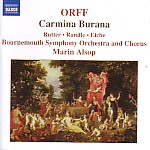You want to like this performance: it’s bold, and it’s gutsy at the start of O Fortuna; but in that same opening song the problems begin. The most serious of these concern the balances, which favor the chorus to the point where it sounds distinctly in front of the orchestra. Granted, the instruments do little more than accompany, but there’s still a lot of color in the score that goes for nothing here (compare Jochum or Kegel in this respect). More importantly, the orchestra gives the music those propulsive rhythms that make the work so exciting, and even before the loud eruptions at the end of the first number the tension has long fled. Similarly, whether it’s the engineering or insensitivity on Alsop’s part, the men begin the second number much too loudly, and so it goes: heavy, noisy, and lacking in both color and expressive variety.
Then there are the soloists. Baritone Markus Eiche has the most to do, and he’s very good, particularly in his two big numbers in Part Two. Tenor Tom Randle is just plain annoying; he brings no terror to the Song of the Roasted Swan, and his audibly stressed (in the wrong way) voice sounds as if placed in a different acoustic from the other two singers. Soprano Claire Rutter begins promisingly, with a charming Stetit puella, but then offers one of the most labored versions of In trutina on disc, followed by an unpleasantly sour Dulcissime. In between, Tempus est iocundum reveals everything that’s wrong with this performance: it’s loud, heavy in rhythm, indistinct in color, and substantially lacking in freshness and joy. In short, even at the Naxos price this is no bargain, particularly with such strong competition (also at mid or budget price) from the likes of Jochum (DG), Ozawa (RCA), and Muti (EMI).
































